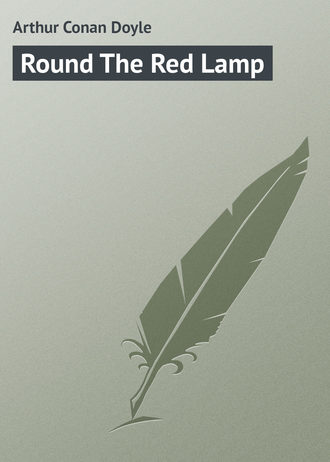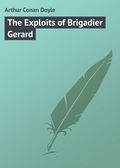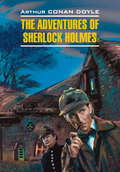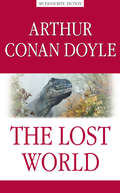
Артур Конан Дойл
Round The Red Lamp
"How do you do, Professor?" said the lady, with some little pomposity of manner. "You were very wise to stay out here on so lovely a day. Is it not heavenly?"
"It is certainly very fine weather," the Professor answered.
"Listen to the wind sighing in the trees!" cried Mrs. Esdaile, holding up one finger. "it is Nature's lullaby. Could you not imagine it, Professor Grey, to be the whisperings of angels?"
"The idea had not occurred to me, madam."
"Ah, Professor, I have always the same complaint against you. A want of rapport with the deeper meanings of nature. Shall I say a want of imagination. You do not feel an emotional thrill at the singing of that thrush?"
"I confess that I am not conscious of one, Mrs. Esdaile."
"Or at the delicate tint of that background of leaves? See the rich greens!"
"Chlorophyll," murmured the Professor.
"Science is so hopelessly prosaic. It dissects and labels, and loses sight of the great things in its attention to the little ones. You have a poor opinion of woman's intellect, Professor Grey. I think that I have heard you say so."
"It is a question of avoirdupois," said the Professor, closing his eyes and shrugging his shoulders. "The female cerebrum averages two ounces less in weight than the male. No doubt there are exceptions. Nature is always elastic."
"But the heaviest thing is not always the strongest," said Mrs. O'James, laughing. "Isn't there a law of compensation in science? May we not hope to make up in quality for what we lack in quantity?"
"I think not," remarked the Professor, gravely. "But there is your luncheon-gong. No, thank you, Mrs. Esdaile, I cannot stay. My carriage is waiting. Good-bye. Good-bye, Mrs. O'James."
He raised his hat and stalked slowly away among the laurel bushes.
"He has no taste," said Mrs. Esdaile – " no eye for beauty."
"On the contrary," Mrs. O'James answered, with a saucy little jerk of the chin. "He has just asked me to be his wife."
As Professor Ainslie Grey ascended the steps of his house, the hall-door opened and a dapper gentleman stepped briskly out. He was somewhat sallow in the face, with dark, beady eyes, and a short, black beard with an aggressive bristle. Thought and work had left their traces upon his face, but he moved with the brisk activity of a man who had not yet bade good-bye to his youth.
"I'm in luck's way," he cried. "I wanted to see you."
"Then come back into the library," said the Professor; "you must stay and have lunch with us."
The two men entered the hall, and the Professor led the way into his private sanctum. He motioned his companion into an arm-chair.
"I trust that you have been successful, O'Brien," said he. "I should be loath to exercise any undue pressure upon my sister Ada; but I have given her to understand that there is no one whom I should prefer for a brother-in-law to my most brilliant scholar, the author of Some Remarks upon the Bile-Pigments, with special reference to Urobilin."
"You are very kind, Professor Grey – you have always been very kind," said the other. "I approached Miss Grey upon the subject; she did not say No."
"She said Yes, then?"
"No; she proposed to leave the matter open until my return from Edinburgh. I go to-day, as you know, and I hope to commence my research to-morrow."
"On the comparative anatomy of the vermiform appendix, by James M'Murdo O'Brien," said the Professor, sonorously. "It is a glorious subject – a subject which lies at the very root of evolutionary philosophy."
"Ah! she is the dearest girl," cried O'Brien, with a sudden little spurt of Celtic enthusiasm – "she is the soul of truth and of honour."
"The vermiform appendix – " began the Professor.
"She is an angel from heaven," interrupted the other. "I fear that it is my advocacy of scientific freedom in religious thought which stands in my way with her."
"You must not truckle upon that point. You must be true to your convictions; let there be no compromise there."
"My reason is true to agnosticism, and yet I am conscious of a void – a vacuum. I had feelings at the old church at home between the scent of the incense and the roll of the organ, such as I have never experienced in the laboratory or the lecture-room."
"Sensuous-purely sensuous," said the Professor, rubbing his chin. "Vague hereditary tendencies stirred into life by the stimulation of the nasal and auditory nerves."
"Maybe so, maybe so," the younger man answered thoughtfully. "But this was not what I wished to speak to you about. Before I enter your family, your sister and you have a claim to know all that I can tell you about my career. Of my worldly prospects I have already spoken to you. There is only one point which I have omitted to mention. I am a widower."
The Professor raised his eyebrows.
"This is news indeed," said he.
"I married shortly after my arrival in Australia. Miss Thurston was her name. I met her in society. It was a most unhappy match."
Some painful emotion possessed him. His quick, expressive features quivered, and his white hands tightened upon the arms of the chair. The Professor turned away towards the window.
"You are the best judge," he remarked "but I should not think that it was necessary to go into details."
"You have a right to know everything – you and Miss Grey. It is not a matter on which I can well speak to her direct. Poor Jinny was the best of women, but she was open to flattery, and liable to be misled by designing persons. She was untrue to me, Grey. It is a hard thing to say of the dead, but she was untrue to me. She fled to Auckland with a man whom she had known before her marriage. The brig which carried them foundered, and not a soul was saved."
"This is very painful, O'Brien," said the Professor, with a deprecatory motion of his hand. "I cannot see, however, how it affects your relation to my sister."
"I have eased my conscience," said O'Brien, rising from his chair; "I have told you all that there is to tell. I should not like the story to reach you through any lips but my own."
"You are right, O'Brien. Your action has been most honourable and considerate. But you are not to blame in the matter, save that perhaps you showed a little precipitancy in choosing a life– partner without due care and inquiry."
O'Brien drew his hand across his eyes.
"Poor girl!" he cried. "God help me, I love her still! But I must go."
"You will lunch with us?"
"No, Professor; I have my packing still to do. I have already bade Miss Grey adieu. In two months I shall see you again."
"You will probably find me a married man."
"Married!"
"Yes, I have been thinking of it."
"My dear Professor, let me congratulate you with all my heart. I had no idea. Who is the lady?"
"Mrs. O'James is her name – a widow of the same nationality as yourself. But to return to matters of importance, I should be very happy to see the proofs of your paper upon the vermiform appendix. I may be able to furnish you with material for a footnote or two."
"Your assistance will be invaluable to me," said O'Brien, with enthusiasm, and the two men parted in the hall. The Professor walked back into the dining– room, where his sister was already seated at the luncheon-table.
"I shall be married at the registrar's," he remarked; "I should strongly recommend you to do the same."
Professor Ainslie Grey was as good as his word. A fortnight's cessation of his classes gave him an opportunity which was too good to let pass. Mrs. O'James was an orphan, without relations and almost without friends in the country. There was no obstacle in the way of a speedy wedding. They were married, accordingly, in the quietest manner possible, and went off to Cambridge together, where the Professor and his charming wife were present at several academic observances, and varied the routine of their honeymoon by incursions into biological laboratories and medical libraries. Scientific friends were loud in their congratulations, not only upon Mrs. Grey's beauty, but upon the unusual quickness and intelligence which she displayed in discussing physiological questions. The Professor was himself astonished at the accuracy of her information. "You have a remarkable range of knowledge for a woman, Jeannette," he remarked upon more than one occasion. He was even prepared to admit that her cerebrum might be of the normal weight.
One foggy, drizzling morning they returned to Birchespool, for the next day would re-open the session, and Professor Ainslie Grey prided himself upon having never once in his life failed to appear in his lecture-room at the very stroke of the hour. Miss Ada Grey welcomed them with a constrained cordiality, and handed over the keys of office to the new mistress. Mrs. Grey pressed her warmly to remain, but she explained that she had already accepted an invitation which would engage her for some months. The same evening she departed for the south of England.
A couple of days later the maid carried a card just after breakfast into the library where the Professor sat revising his morning lecture. It announced the re-arrival of Dr. James M'Murdo O'Brien. Their meeting was effusively genial on the part of the younger man, and coldly precise on that of his former teacher.
"You see there have been changes," said the Professor.
"So I heard. Miss Grey told me in her letters, and I read the notice in the British Medical Journal. So it's really married you are. How quickly and quietly you have managed it all!"
"I am constitutionally averse to anything in the nature of show or ceremony. My wife is a sensible woman – I may even go the length of saying that, for a woman, she is abnormally sensible. She quite agreed with me in the course which I have adopted."
"And your research on Vallisneria?"
"This matrimonial incident has interrupted it, but I have resumed my classes, and we shall soon be quite in harness again."
"I must see Miss Grey before I leave England. We have corresponded, and I think that all will be well. She must come out with me. I don't think I could go without her."
The Professor shook his head.
"Your nature is not so weak as you pretend," he said. "Questions of this sort are, after all, quite subordinate to the great duties of life."
O'Brien smiled.
"You would have me take out my Celtic soul and put in a Saxon one," he said. "Either my brain is too small or my heart is too big. But when may I call and pay my respects to Mrs. Grey? Will she be at home this afternoon?"
"She is at home now. Come into the morning-room. She will be glad to make your acquaintance."
They walked across the linoleum-paved hall. The Professor opened the door of the room, and walked in, followed by his friend. Mrs. Grey was sitting in a basket-chair by the window, light and fairy-like in a loose-flowing, pink morning-gown. Seeing a visitor, she rose and swept towards them. The Professor heard a dull thud behind him. O'Brien had fallen back into a chair, with his hand pressed tight to his side.
"Jinny!" he gasped – "Jinny!"
Mrs. Grey stopped dead in her advance, and stared at him with a face from which every expression had been struck out, save one of astonishment and horror. Then with a sharp intaking of the breath she reeled, and would have fallen had the Professor not thrown his long, nervous arm round her.
"Try this sofa," said he.
She sank back among the cushions with the same white, cold, dead look upon her face. The Professor stood with his back to the empty fireplace and glanced from the one to the other.
"So, O'Brien," he said at last, "you have already made the acquaintance of my wife!"
"Your wife, " cried his friend hoarsely. "She is no wife of yours. God help me, she is MY wife."
The Professor stood rigidly upon the hearthrug. His long, thin fingers were intertwined, and his head sunk a little forward. His two companions had eyes only for each other.
"Jinny!" said he.
"James!"
"How could you leave me so, Jinny? How could you have the heart to do it? I thought you were dead. I mourned for your death – ay, and you have made me mourn for you living. You have withered my life."
She made no answer, but lay back among her cushions with her eyes still fixed upon him.
"Why do you not speak?"
"Because you are right, James. I have treated you cruelly – shamefully. But it is not as bad as you think."
"You fled with De Horta."
"No, I did not. At the last moment my better nature prevailed. He went alone. But I was ashamed to come back after what I had written to you. I could not face you. I took passage alone to England under a new name, and here I have lived ever since. It seemed to me that I was beginning life again. I knew that you thought I was drowned. Who could have dreamed that fate would throw us together again! When the Professor asked me – "
She stopped and gave a gasp for breath.
"You are faint," said the Professor – "keep the head low; it aids the cerebral circulation." He flattened down the cushion. "I am sorry to leave you, O'Brien; but I have my class duties to look to. Possibly I may find you here when I return."
With a grim and rigid face he strode out of the room. Not one of the three hundred students who listened to his lecture saw any change in his manner and appearance, or could have guessed that the austere gentleman in front of them had found out at last how hard it is to rise above one's humanity. The lecture over, he performed his routine duties in the laboratory, and then drove back to his own house. He did not enter by the front door, but passed through the garden to the folding glass casement which led out of the morning-room. As he approached he heard his wife's voice and O'Brien's in loud and animated talk. He paused among the rose-bushes, uncertain whether to interrupt them or no. Nothing was further from his nature than play the eavesdropper; but as he stood, still hesitating, words fell upon his ear which struck him rigid and motionless.
"You are still my wife, Jinny," said O'Brien; "I forgive you from the bottom of my heart. I love you, and I have never ceased to love you, though you had forgotten me."
"No, James, my heart was always in Melbourne. I have always been yours. I thought that it was better for you that I should seem to be dead."
"You must choose between us now, Jinny. If you determine to remain here, I shall not open my lips. There shall be no scandal. If, on the other hand, you come with me, it's little I care about the world's opinion. Perhaps I am as much to blame as you. I thought too much of my work and too little of my wife."
The Professor heard the cooing, caressing laugh which he knew so well.
"I shall go with you, James," she said.
"And the Professor —?"
"The poor Professor! But he will not mind much, James; he has no heart."
"We must tell him our resolution."
"There is no need," said Professor Ainslie Grey, stepping in through the open casement. "I have overheard the latter part of your conversation. I hesitated to interrupt you before you came to a conclusion."
O'Brien stretched out his hand and took that of the woman. They stood together with the sunshine on their faces. The Professor paused at the casement with his hands behind his back, and his long black shadow fell between them.
"You have come to a wise decision," said he. "Go back to Australia together, and let what has passed be blotted out of your lives."
"But you – you – " stammered O'Brien.
The Professor waved his hand.
"Never trouble about me," he said.
The woman gave a gasping cry.
"What can I do or say?" she wailed. "How could I have foreseen this? I thought my old life was dead. But it has come back again, with all its hopes and its desires. What can I say to you, Ainslie? I have brought shame and disgrace upon a worthy man. I have blasted your life. How you must hate and loathe me! I wish to God that I had never been born!"
"I neither hate nor loathe you, Jeannette," said the Professor, quietly. "You are wrong in regretting your birth, for you have a worthy mission before you in aiding the life-work of a man who has shown himself capable of the highest order of scientific research. I cannot with justice blame you personally for what has occurred. How far the individual monad is to be held responsible for hereditary and engrained tendencies, is a question upon which science has not yet said her last word."
He stood with his finger-tips touching, and his body inclined as one who is gravely expounding a difficult and impersonal subject. O'Brien had stepped forward to say something, but the other's attitude and manner froze the words upon his lips. Condolence or sympathy would be an impertinence to one who could so easily merge his private griefs in broad questions of abstract philosophy.
"It is needless to prolong the situation," the Professor continued, in the same measured tones. "My brougham stands at the door. I beg that you will use it as your own. Perhaps it would be as well that you should leave the town without unnecessary delay. Your things, Jeannette, shall be forwarded."
O'Brien hesitated with a hanging head.
"I hardly dare offer you my hand," he said.
"On the contrary. I think that of the three of us you come best out of the affair. You have nothing to be ashamed of."
"Your sister – "
"I shall see that the matter is put to her in its true light. Good-bye! Let me have a copy of your recent research. Good-bye, Jeannette!"
"Good-bye!"
Their hands met, and for one short moment their eyes also. It was only a glance, but for the first and last time the woman's intuition cast a light for itself into the dark places of a strong man's soul. She gave a little gasp, and her other hand rested for an instant, as white and as light as thistle-down, upon his shoulder.
"James, James!" she cried. "Don't you see that he is stricken to the heart?"
He turned her quietly away from him.
"I am not an emotional man," he said. "I have my duties – my research on Vallisneria. The brougham is there. Your cloak is in the hall. Tell John where you wish to be driven. He will bring you anything you need. Now go."
His last two words were so sudden, so volcanic, in such contrast to his measured voice and mask– like face, that they swept the two away from him. He closed the door behind them and paced slowly up and down the room. Then he passed into the library and looked out over the wire blind. The carriage was rolling away. He caught a last glimpse of the woman who had been his wife. He saw the feminine droop of her head, and the curve of her beautiful throat.
Under some foolish, aimless impulse, he took a few quick steps towards the door. Then he turned, and throwing himself into his study-chair he plunged back into his work.
There was little scandal about this singular domestic incident. The Professor had few personal friends, and seldom went into society. His marriage had been so quiet that most of his colleagues had never ceased to regard him as a bachelor. Mrs. Esdaile and a few others might talk, but their field for gossip was limited, for they could only guess vaguely at the cause of this sudden separation.
The Professor was as punctual as ever at his classes, and as zealous in directing the laboratory work of those who studied under him. His own private researches were pushed on with feverish energy. It was no uncommon thing for his servants, when they came down of a morning, to hear the shrill scratchings of his tireless pen, or to meet him on the staircase as he ascended, grey and silent, to his room. In vain his friends assured him that such a life must undermine his health. He lengthened his hours until day and night were one long, ceaseless task.
Gradually under this discipline a change came over his appearance. His features, always inclined to gauntness, became even sharper and more pronounced. There were deep lines about his temples and across his brow. His cheek was sunken and his complexion bloodless. His knees gave under him when he walked; and once when passing out of his lecture– room he fell and had to be assisted to his carriage.
This was just before the end of the session and soon after the holidays commenced the professors who still remained in Birchespool were shocked to hear that their brother of the chair of physiology had sunk so low that no hopes could be entertained of his recovery. Two eminent physicians had consulted over his case without being able to give a name to the affection from which he suffered. A steadily decreasing vitality appeared to be the only symptom – a bodily weakness which left the mind unclouded. He was much interested himself in his own case, and made notes of his subjective sensations as an aid to diagnosis. Of his approaching end he spoke in his usual unemotional and somewhat pedantic fashion. "It is the assertion," he said, "of the liberty of the individual cell as opposed to the cell-commune. It is the dissolution of a co-operative society. The process is one of great interest."
And so one grey morning his co-operative society dissolved. Very quietly and softly he sank into his eternal sleep. His two physicians felt some slight embarrassment when called upon to fill in his certificate.
"It is difficult to give it a name," said one.
"Very," said the other.
"If he were not such an unemotional man, I should have said that he had died from some sudden nervous shock – from, in fact, what the vulgar would call a broken heart."
"I don't think poor Grey was that sort of a man at all."
"Let us call it cardiac, anyhow," said the older physician.
So they did so.





